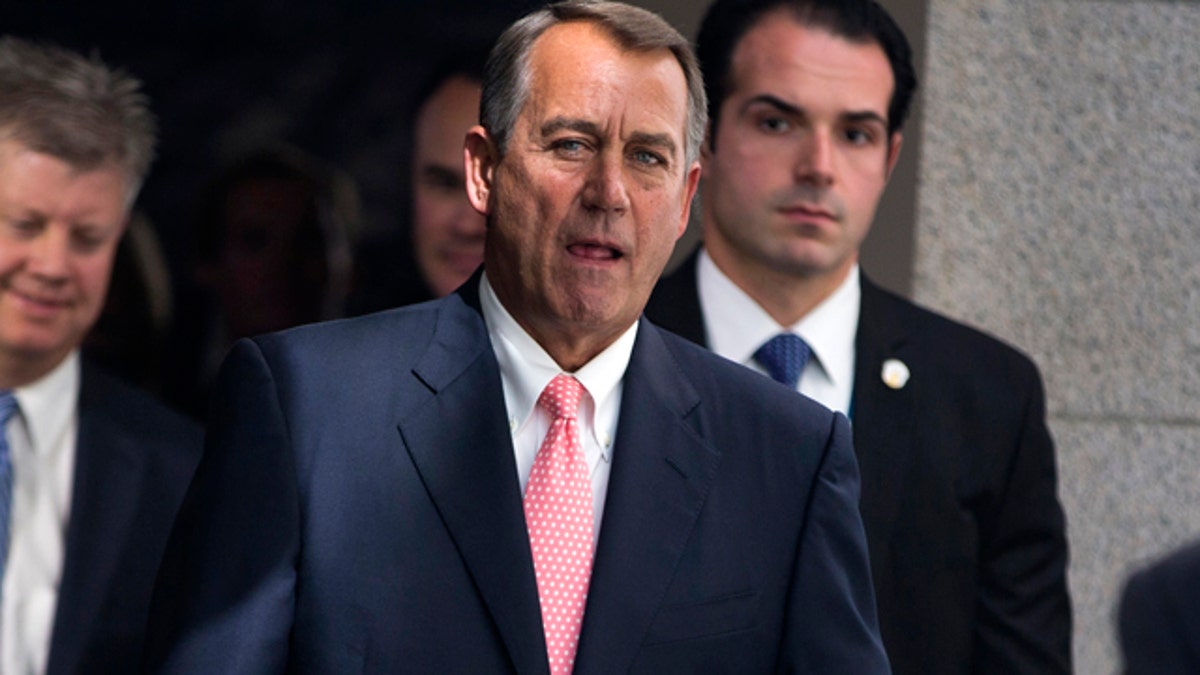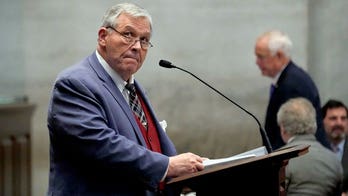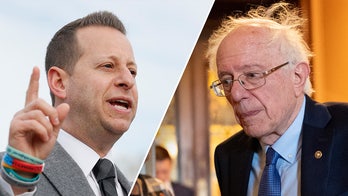
FILE: Sept. 30, 2013: House Speaker John Boehner of Ohio walks to a House Republican Conference meeting to discuss the ongoing budget fight. (AP)
Now the story moves outside the Beltway.
After huge swaths of the federal government shut down this morning, the media are no longer confining their coverage to the maneuvers, rhetoric, filibusters and slow-motion theatrics that define Washington these days.
Now we see how it’s playing out in Peoria and Pittsburgh and Phoenix.
Here are people worried about not getting their checks. Here are some of the 800,000 furloughed federal workers concerned about feeding their kids, while Congress gets paid. Here are the roads where construction has stopped. Here are food plants not getting inspected. Here are the national parks turning away tourists.
A ginned-up crisis has suddenly become very real.
Every newspaper and television station in America can localize the story, turning it from a distant political battle to an upheaval on the home turf.
And every person interviewed will be asked what they think of Congress failing to pass a budget, and who is to blame.
And that will change the political dynamic in a heartbeat.
Until now, the media have been engaged in narrowcasting. For all the manufactured drama of a countdown to chaos, the proceedings have been followed mainly by political and media junkies.
Now we switch to broadcasting, a story that affects everyone in America, and that impact will grow if the shutdown drags on.
Now the battle between the John Boehner and Ted Cruz wings of the Republican Party, and the GOP’s fight with the White House, is no longer just about point-scoring and positioning for 2016. It’s about whether the government can keep the lights on, and, in a couple of weeks, whether the United States can pay its bills for past debt.
The argument over ObamaCare, which is the motivating principle for hard-line conservative Republicans, will be front and center as well. But whatever the visible effects are of the health insurance exchanges that open today, and which will take months to gear up, will be overshadowed by the here and now evidence of the shutdown’s impact.
After Cruz’s moment in the national spotlight, the focus is shifting back to Boehner, who holds the key to any compromise.
As the New Republic says, “mainstream media coverage of these showdowns tends to be withering because reporters who cover Congress and the White House all know Boehner himself thinks the conflict is pointless and almost certain to backfire.”
“Back in 2011, reporters knew Boehner had wanted to accept the Reid-McConnell deal but was forced to reverse course when the House lunatics erupted on that Saturday conference call,” it continues. “It gave these reporters an imprimatur to describe the House position as deeply misguided. Same goes this time around: Every reporter in Washington knows Boehner has been trying to avoid a shutdown for months. This gives them the cover they need to suspend the usual norms of even-handedness and describe the move as irrational and self-sabotaging.”
National Review, for its part, says that “large numbers of House Republicans, while not exactly rooting for a shutdown, certainly feel comfortable with the idea of stopping ObamaCare at all costs…Other House conservatives concur and seem ready to cast Senate majority leader Harry Reid as the villain…"
“The leadership, however, is worried about the likely public takeaway from any shutdown: Leaders fear that national press would harp on Republicans’ supposed intransigence rather than the Senate’s responsibility,” it continues. “Boehner’s contingent seems almost resigned to the mutual suspicion between the leadership and a group of about 30 conservative members. Sources say distrust is as high as it’s been since Republicans won the House in 2010, and they predict that a sizable bloc would obstruct any watered-down plan.”
For now, at least, 46 percent in a new CNN poll say they would blame a shutdown on the Republicans, with 36 percent blaming President Obama.
It’s fair to say most of the mainstream media are faulting the Republicans for the shutdown.
Bob Woodward says the GOP is trying to “blackmail” the president.
The Atlantic’s James Fallows says, “as a matter of journalism, any story that presents the disagreements as a ‘standoff,’ a ‘showdown,’ a ‘failure of leadership,’ a sign of ‘partisan gridlock,’ or any of the other usual terms for political disagreement, represents a failure of journalism and an inability to see or describe what is going on….”
“This isn't ‘gridlock,’” Fallows says. “It is a ferocious struggle within one party, between its traditionalists and its radical factions, with results that unfortunately can harm all the rest of us -- and, should there be a debt default, could harm the rest of the world too.”
Conservatives counter that the media narrative is wrong, that the Democrats are the ones who triggered a shutdown by refusing to negotiate.
But it’s no secret that Boehner wanted to avoid this mess, and could reopen the government at any moment by putting a clean bill on the floor. Such a bill would not contain an ObamaCare provision and would pass largely with Democratic votes. But that is a difficult thing for a speaker with such a determined hard-line faction to do.
The question is whether the media’s coverage of a continuing shutdown will gradually change that equation.
Why CNN and NBC Bailed On Their Hillary Projects
It looks like CNN and NBC will get to televise the 2016 Republican presidential debates after all.
That’s the takeaway from CNN’s decision to cancel its planned Hillary Clinton documentary. But what torpedoed it was not the GOP’s threat but stonewalling by Hillaryland.
Filmmaker Charles Ferguson said he simply couldn’t continue because the former secretary of state’s associates were refusing to sit for interviews.
NBC, which was planning a Hillary miniseries and didn’t need cooperation, apparently didn’t want to be hanging out there on its own.
“After reviewing and prioritizing our slate of movie/miniseries development,” the network said, “we’ve decided that we will no longer continue developing the Hillary Clinton miniseries.”
Ferguson detailed his CNN effort in an angry account on HuffPost.
“The day after the contract was signed, I received a message from Nick Merrill, Hillary Clinton's press secretary,” Ferguson said. “He already knew about the film, and clearly had a source within CNN. He interrogated me; at first I answered, but eventually I stopped. When I requested an off-the-record, private conversation with Mrs. Clinton, Merrill replied that she was busy writing her book, and not speaking to the media.
“Next came Phillipe Reines, Hillary Clinton's media fixer, who contacted various people at CNN, interrogated them, and expressed concern about alleged conflicts of interest generated because my film was a for-profit endeavor (as nearly all documentaries and news organizations are)…”
Then there was Ferguson’s private conversation with Bill Clinton.
“I asked him about the financial crisis,” Ferguson says. “He paused and then became even more soulful, thoughtful, passionate, and articulate. And then he proceeded to tell me the most amazing lies I've heard in quite a while.”
Ferguson says his bottom line was “when I approached people for interviews, I discovered that nobody, and I mean nobody, was interested in helping me make this film. Not Democrats, not Republicans -- and certainly nobody who works with the Clintons, wants access to the Clintons, or dreams of a position in a Hillary Clinton administration. Not even journalists who want access, which can easily be taken away. I even sensed potential difficulty in licensing archival footage from CBN (Pat Robertson) and from Fox.”
I wonder why the Clintonistas were wary of this guy.
This was always the irony of the CNN venture. While Republicans were angry about what they viewed as a puffy project to burnish Clinton’s image for 2016, the Clinton folks wanted no part of a documentary they couldn’t control, which might have delved into such uncomfortable topics as Monica and Benghazi.
“It’s a bad precedent for a TV network to cancel a political documentary under pressure from any interested party–the subject or her rivals,” Time’s James Poniewozik writes. “It only emboldens political advocates to lobby against programming in the future. The fact that active politicians won’t like it is not a good reason to avoid making programming about active politicians. That said, I can only take Ferguson, a widely respected filmmaker, at his word when he says that the lack of access simply made it impossible to do the documentary he planned.”
Mission Impossible, as it turned out.




